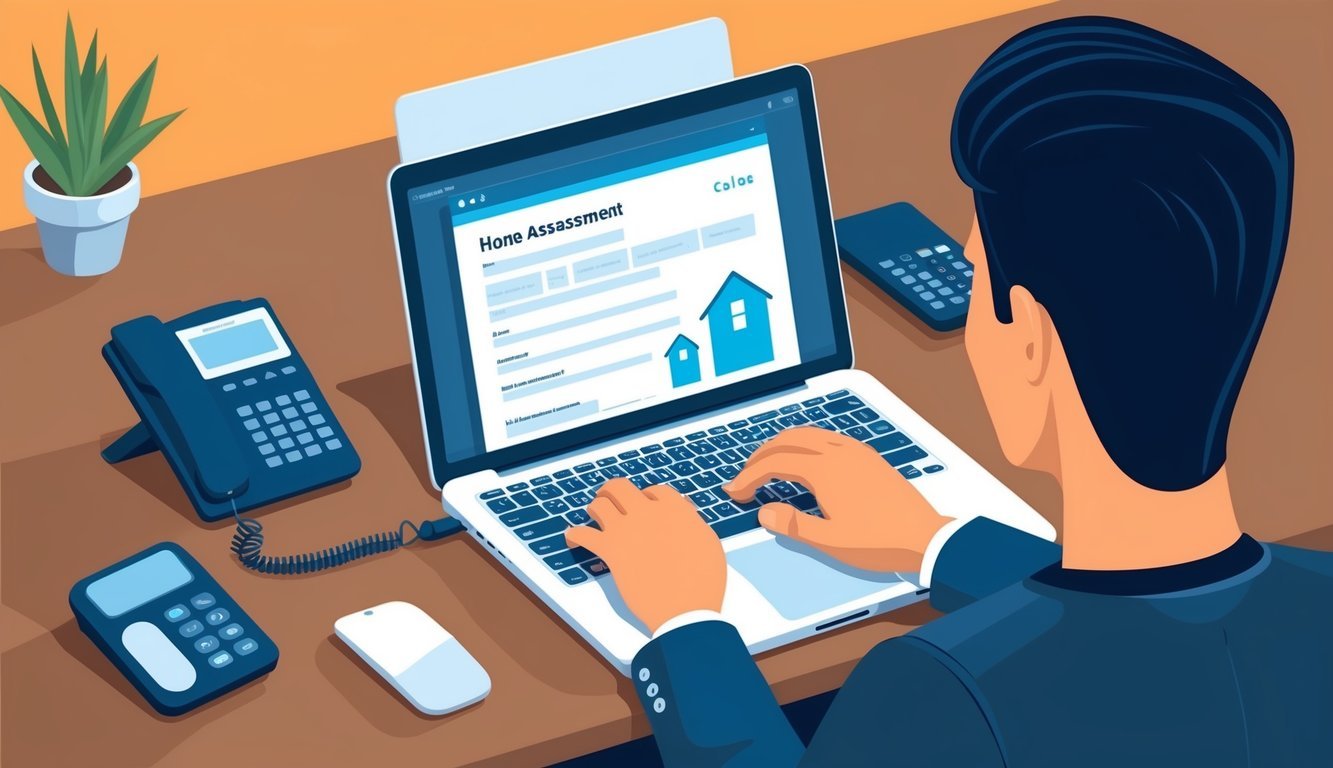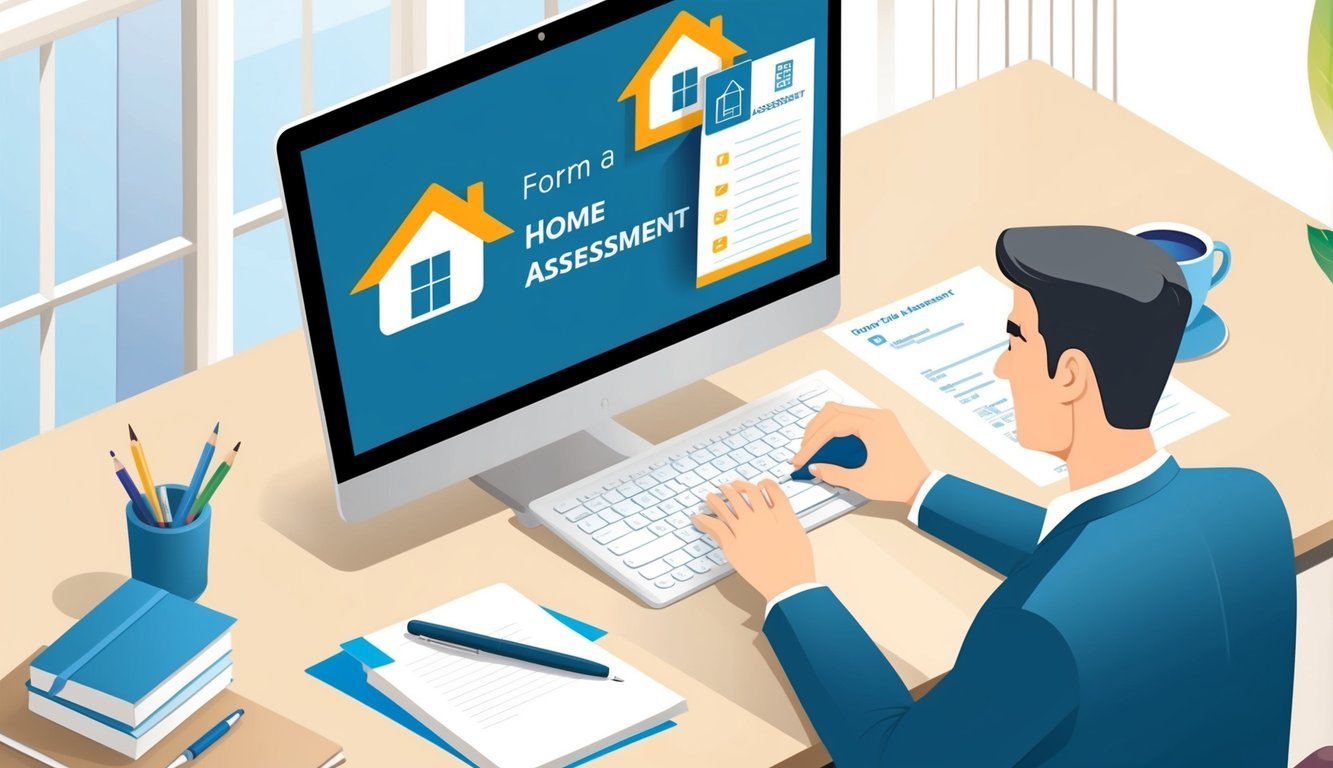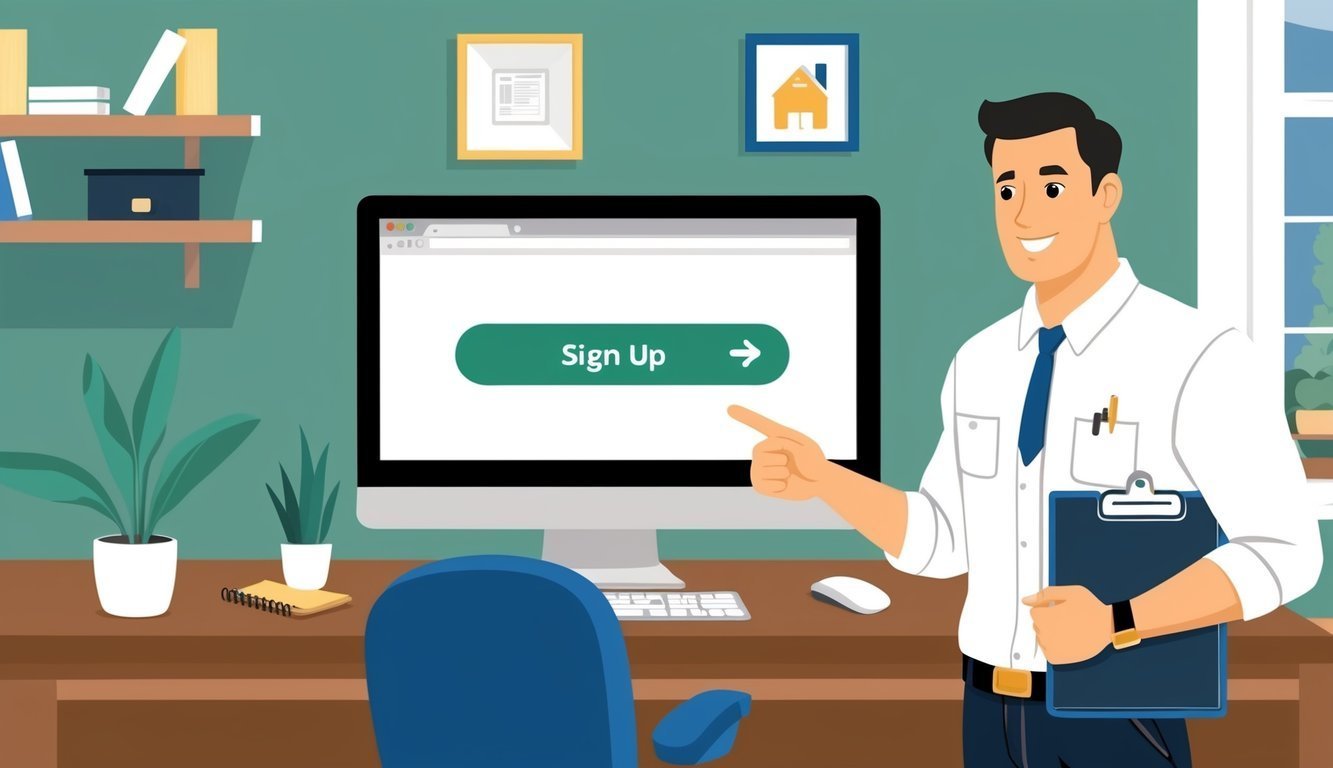Looking to save some cash on your energy bills? A home energy assessment could be your ticket to savings! It’s a straightforward process that helps you discover how to make your home more energy-efficient and comfortable.
Believe it or not, with the right tweaks, you can cut your energy costs by up to 30%—now that’s something to smile about!
alt=’A person pointing at a computer screen with a “Sign Up” button while a home inspector holds a clipboard and gestures toward a house’>
Getting started couldn’t be simpler.
Many states and utility companies offer these assessments for free or at a low cost.
They’ll send an expert to comb through your home from ceiling to floor, checking out insulation, air leaks, and your heating system.
After the assessment, you’ll receive a detailed report packed with tips on saving energy.
You might even snag some rebates for energy-efficient upgrades.
It’s a smart way to cozy up your home and put a little extra money back in your wallet.
Key Takeaways
- Home energy assessments can lead to substantial savings on your energy bills.
- Many programs offer free or budget-friendly assessments done by trained professionals.
- Completing an assessment may qualify you for rebates on energy-efficient home improvements.
Understanding Home Energy Assessments
A home energy assessment is a fantastic way to pinpoint how to save energy and money.
It evaluates how your home uses energy and provides personalized improvement suggestions.
What Is a Home Energy Assessment?
A home energy assessment is like a check-up for your house.
It identifies where you’re wasting energy.
An expert visits your home to evaluate everything from the roof down to the basement, covering your heating, cooling, and appliances.
The assessment can be done in-person or virtually.
For a virtual assessment, you’ll walk around your home during a video call and show the expert different areas.
It’s like giving them a tour without them stepping foot inside—pretty neat, right?
During the visit, the specialist might use high-tech tools to sniff out air leaks and assess insulation quality.
They’ll also take a peek at your energy bills to spot usage patterns.
Benefits of Energy Assessments
Energy assessments can save you big bucks while ramping up your home’s comfort.
Here are some key benefits:
- Lower energy costs
- More comfortable living spaces
- Improved air quality
- Increased home value
After your assessment, you’ll get a list of suggested upgrades.
These might include adding insulation or sealing up those pesky drafts.
The best part? Many of these fixes are affordable and easy to tackle.
Some energy-saving improvements might even qualify for rebates or tax credits, helping offset the cost of those upgrades.
The Role of an Energy Specialist
Your energy specialist is the pro handling your assessment.
They’re trained to spot energy-wasting culprits lurking in your home.
Here’s what they do:
- Inspect your home’s structure
- Evaluate your heating and cooling systems
- Look for air leaks
- Assess insulation levels
- Analyze your energy bills
They come equipped with tools like blower doors and infrared cameras to find hidden issues that drain your energy.
After the check-up, you’ll get a report with their findings, explained in simple terms.
They’ll even help you figure out which upgrades make the most sense for your budget.
Steps to Sign Up for Home Assessment in Massachusetts

Signing up for a home energy assessment in Massachusetts is a breeze and could lead to some serious savings.
You could get rebates and free upgrades that make your home more cozy and efficient.
Eligibility and Requirements
To qualify for a home assessment in Massachusetts, you need to either own or rent a home in the state.
Single-family homes and buildings with up to four units can participate.
The program is largely managed by Mass Save.
If you’re renting, make sure you get your landlord’s approval before signing up.
Your home needs to receive power from a participating utility company, too.
If you’ve had an assessment in the past two years, you may need to wait before getting another one.
Unsure if your utility company is on board? Just check their website or give customer support a call! And be sure to read through any eligibility details before moving forward.
If you’re looking to sign up for electrical service, most utility companies have step-by-step guidance on their sites or through customer service.
Finding the Right Program
While Mass Save is the go-to program for many in Massachusetts, some towns have their own offerings.
It’s worth checking with your local government to see what’s available.
Mass Save provides both in-person and virtual assessments.
In-person visits are usually more thorough, allowing the energy expert to get up close and personal with your home’s quirks.
If you’re pressed for time or have a simpler home setup, a virtual assessment can do the trick! You’ll chat over a video call, making it quick and convenient.
The Sign-Up Process
Getting on board for a Mass Save assessment is a snap.
You can call 1-866-527-SAVE or book online.
Just have your utility account info handy when you call.
Once you sign up, you’ll pick a date for your assessment.
The expert will check out things like:
- Insulation
- Air leaks
- Heating and cooling systems
- Lighting
After your visit, you’ll receive that all-important report filled with energy-saving tips.
You might also walk away with free goodies like LED bulbs or a smart thermostat.
Plus, the expert will fill you in on rebates for bigger upgrades, like new insulation or heating systems.
Frequently Asked Questions

Home energy assessments are a great way for homeowners to save money and boost comfort.
They involve professional inspections, tests, and recommendations tailored for you.
Here are some common questions people ask about the process.
What’s involved in a home energy assessment?
A home energy assessment evaluates how your house uses energy.
An expert checks out your insulation, heating, cooling systems, and appliances.
They might use specialized tools to find air leaks or heat loss.
By the end, you’ll get a report stuffed with tips to save energy and money.
Where can I find a free home energy audit near me?
More often than not, your local utility company offers free energy audits to their customers.
Check their website or give them a ring.
Some cities and states also have programs for free assessments.
Community organizations sometimes jump in on this too.
Can you do an energy audit of your home on your own?
You bet! You can perform a basic energy audit on your own.
Walk around your home and look for drafts, poor insulation, and outdated appliances.
Glance at your energy bills to uncover high usage periods.
It won’t be as thorough as a pro audit, but it can still help you spot some easy ways to save energy.
How much does a professional home energy audit typically cost?
Most professional energy audits fall between $200 and $650.
The cost often depends on the size of your home and how in-depth the audit is.
Some assessments include high-tech tests that can drive up the price.
Remember, many utilities offer free or discounted options!
What should be on my checklist for a home energy audit?
Start by jotting down any comfort issues you notice around your home.
Gather up previous energy bills to show usage trends.
Make sure the auditor can access all areas of your place, and be ready to answer questions about your daily habits and energy usage.
Are energy audits really worth the time and money?
Absolutely! Energy audits are often worth every penny.
They can reveal ways to trim your energy bills by anywhere from 5% to 30%.
Plus, they make your home comfier and improve air quality too.
Trust me; the savings from following audit recommendations can quickly pay off the cost of the audit itself. Source

